

Www.tes. In a primary school in South London, a teacher is talking about pineapple-shaped swimming pools.
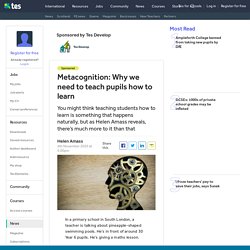
He’s in front of around 30 Year 6 pupils. He’s giving a maths lesson. On the surface, this is to test the pupils’ skills in calculating perimeter and area, as that appears to be the focus of the lesson. Teachers: how to achieve your goals. Every month Stuart Kime trawls through his greatest research hits to offer practical implementation tips for using evidence in practice It’s mid-September, Sunday evening, Norwich.
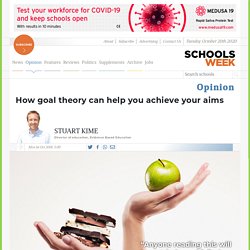
In search of a healthy, tasty post-train journey dinner, I head to Namaste, the place I consider to serve the best curry in the world. Closed. Hasty, hunger-induced and quasi-maniacal Google-mapping shows a well-reviewed eatery nearby: I am Cosmo-bound. Minutes later, the evening’s nutrition is an all-you-can-eat buffet to slay them all. Anyone reading this will have tried – and failed – to achieve a goal. First, Latham and Locke suggest that there are specific aspects of goals that maximise the chances of them being achieved, so here are the first tips: sharpen the specificity of your goal, and understand the difficulty of it as well as the difficulty of achieving it (two different things).
Learning to Learn: High impact for low cost, or snake oil for hipsters? – Rethinking Education. This is an extract from our forthcoming book Fear is the Mind Killer: Why Learning to Learn deserves lesson time – and how to make it work for your pupils, which should hit the shelves by the end of the month (October 2020).
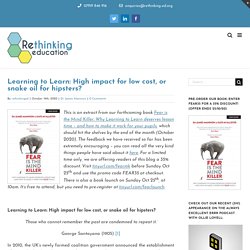
The feedback we have received so far has been extremely encouraging – you can read all the very kind things people have said about it here. For a limited time only, we are offering readers of this blog a 35% discount. Visit tinyurl.com/fearmk before Sunday Oct 25th and use the promo code FEAR35 at checkout. There is also a book launch on Sunday Oct 25th, at 10am. It’s free to attend, but you need to pre-register at tinyurl.com/fearlaunch. The Makings of Metacognition. In a couple of weeks, year 6 pupils will be sitting down to SATs examinations and in secondary schools, A Level and GCSE exams will start in earnest.
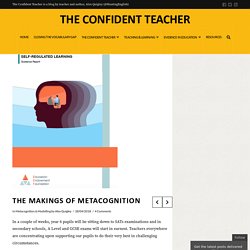
Teachers everywhere are concentrating upon supporting our pupils to do their very best in challenging circumstances. Every teacher knows that the seeds of examination success are sown far in advance of the frenzied exam run-in. Like flowers in bloom, all the hard word is done preparing the ground months, even years, in advance. 10.1.1.124.8616. Teaching metacognitively isn’t a new phenomenon. Developing metacognition. Making sense of metacognition. EEF Blog: Improving reading comprehension through strategy instruction. In this blog, Robbie Coleman – a secondary school English teacher and a Senior Associate at the EEF – looks at the debates and recent developments about explicitly teaching thinking strategies in lessons.
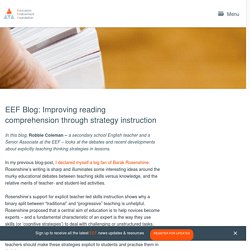
In my previous blog-post, I declared myself a big fan of Barak Rosenshine. Rosenshine’s writing is sharp and illuminates some interesting ideas around the murky educational debates between teaching skills versus knowledge, and the relative merits of teacher- and student-led activities. Rosenshine’s support for explicit teacher-led skills instruction shows why a binary split between “traditional” and “progressive” teaching is unhelpful. Rosenshine proposed that a central aim of education is to help novices become experts – and a fundamental characteristic of an expert is the way they use skills (or ‘cognitive strategies’) to deal with challenging or unstructured tasks.
Why I love… Metacognitive Activities – susansenglish. Metacognition is defined as: “higher-order thinking that enables understanding, analysis, and control of one’s cognitive processes, especially when engaged in learning.”
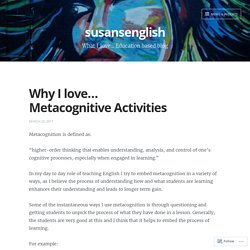
In my day to day role of teaching English I try to embed metacognition in a variety of ways, as I believe the process of understanding how and what students are learning enhances their understanding and leads to longer term gain. Ten teaching techniques to practise – deliberately. It’s a well-established idea that, to develop expertise in a particular skill or technique, you need to practise.
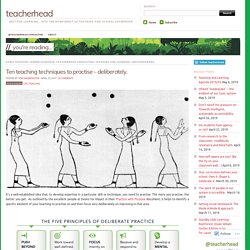
The more you practise, the better you get. As outlined by the excellent people at Deans for Impact in their Practice with Purpose document, it helps to identify a specific element of your teaching to practise on and then focus very deliberately on improving in that area. This much I know about…The Sutton Trust/EEF Toolkit and the Golden Thread from evidence to student outcomes, via deliberate intervention. I have been a teacher for 26 years, a Headteacher for 11 years and, at the age of 50, this much I know about The Sutton Trust/EEF Toolkit and the Golden Thread from evidence to student outcomes, via deliberate intervention.
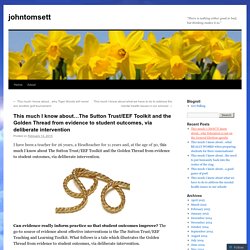
Can evidence really inform practice so that student outcomes improve? The go-to source of evidence about effective interventions is the The Sutton Trust/EEF Teaching and Learning Toolkit. What follows is a tale which illustrates the Golden Thread from evidence to student outcomes, via deliberate intervention. Interventions to help students learn can be done for next to nothing.